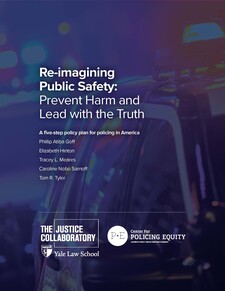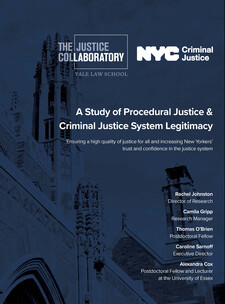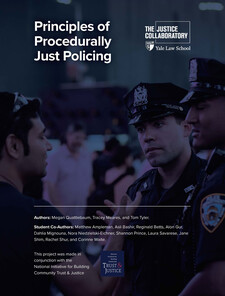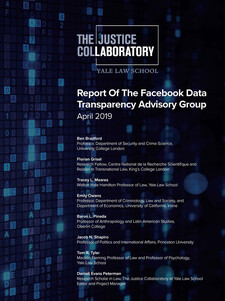At the Justice Collaboratory, we’ve undertaken a variety of projects involving the study of procedural justice in both legal and community settings. Examples of our legitimacy and procedural justice work include:

Reimagining Public Safety
On October 23, 2020, the Justice Collaboratory at Yale Law School and the Policing Project at New York University School of Law hosted a virtual convening on reimagining public safety in the United States. Our goal was to bring together a broad, crosscutting, and inclusive group of advocates, community leaders, policymakers, practitioners, and researchers to discuss what a reimagined system should look like and how best to achieve it.
Our conversation, summarized in this report, was geared toward identifying both solutions and processes for implementing change and, importantly, identifying hurdles and ways to overcome them. In January 2021, we convened a group of thought leaders from policing agencies, unions, academia, and government to solicit their perspectives on the same set of issues—a summary report is forthcoming. Ultimately, we hope to identify areas of common ground and produce a working document intended for practitioners, community members, and government officials to provide resources in navigating their ongoing efforts to reimagine and transform public safety.
Highlights
- The group identified three foundational shifts that must occur to achieve a new vision of public safety: ending systemic racism; decoupling public safety from policing; and centering community voices.
- For virtually all participants, reimagining public safety requires building an environment in which people can live and thrive, and where resources are available to not just reduce violence and crime but also to protect and support physical, mental, social, and economic wellbeing.
- There is no single solution that will work for every jurisdiction, but there are many commonalities that can inform learning paths and continuous reform efforts.
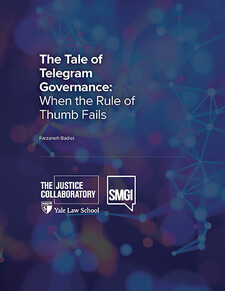
The Tale of Telegram Governance: When the Rule of Thumb Fails
Protection of human rights, people’s safety and security, privacy, and freedom of expression on the Internet cannot happen through purely technical solutions. Tech platforms need a governance mechanism to govern the behavior of their users and allow their users to govern themselves.
This report focuses on Telegram, a messaging app that facilitates the development of various new kinds of discourses in online spaces. Telegram presents itself as an app that wants to protect people from censorship and provide them a safe and secure online environment. However, as this report details, technology solutions and “the rule of thumb” help neither Telegram nor its communities.
The report discusses the shortcoming of Telegram’s processes and applies procedural justice and collective efficacy to provide concrete governance recommendations that Telegram and similar tech platforms can use to protect their users and allow for users to govern and protect themselves.

Changing the Law to Change Policing: First Steps
Recent events since the death of George Floyd have brought forth longstanding concerns about the nature of policing in the United States and how it undermines racial equity. As an institution, policing needs significant reconsideration. It is time to rethink the structure and governance of policing. It is also time to engage in a deeper conversation about the meaning of public safety.
Public Safety Policy
Released ahead of the 2020 presidential election, Re-Imagining Public Safety: Prevent Harm and Lead with the Truth provides recommendations for police reform. This report contains a five-step policy action plan highlighting the critical next steps to advance policing in America.
MOCJ
Our experiment for the New York City Mayor’s Office of Criminal Justice examined perceptions of procedural justice with both NYC community members and its criminal justice workers. Few studies had previously attempted to measure procedural justice on a community level, and had tended to focus on one criminal justice agency at a time. The Justice Collaboratory’s study fulfilled the goal of putting into practice “principles of fairness and procedural justice” by looking into New Yorker’s engagement with the city government.
Principles of Procedurally Just Policing
The Principles of Just Policing report offers a new set of practical guidelines aimed at incorporating procedural justice into policing practices. Written for an audience of policy-makers and policing executives, these guidelines are meant to aide departments in adapting and developing policies that will strengthen legitimacy and trust in interactions with the communities they serve.
Report Of The Facebook Data Transparency Advisory Group
In concert with Facebook, Justice Collaboratory faculty co-directors Tracey Meares and Tom Tyler lead a team of seven independent experts to assess the metrics included in the first two versions of its Community Standards Enforcement Report. This Data Transparency Advisory Group (DTAG) created a final report summarizing its findings.
